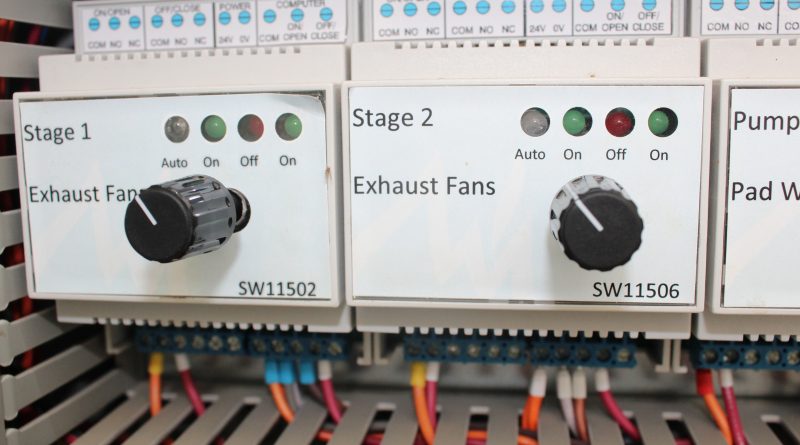Commercial Success with Hydroponics
Go Fresh! produces a range of high-quality vegetables for top-end local hospitality outlets in a hydroponic system in Gaborone, as well in Maun, roughly 1000km north of the capital city. Michelle Adelman, the Managing Director of this 21st Century farming enterprise explains to Rocky Gofamodimo what it takes to run such an intensive farming operation that requires micro-management around the clock.
While hydroponics might be a new phenomenon in Botswana, it’s not entirely a new concept. Plants have been grown in water such as in lakes and swamplands from ancient times.
Go Fresh! and Hydroponic Systems
“We have a manifesto which describes who we are, how we look at ourselves, what we stand for and how we behave on a daily basis. This is very important.” Says Michelle, the founder of Go Fresh!. She went on to explain that while they operate as Go Fresh!, the main company is called Landon Organic. Go Fresh! started operating on a 7-hectare farm back in 2014.
“There are many factors as to why hydroponics is ideal for Botswana.” explains Michelle. The world over, agriculture is reportedly using as much as up to 70% of the planet’s available freshwater, which is a very scarce commodity for the Southern African semi-desert nation prone to inconsistent and erratic weather conditions.
The unpredictable weather has made droughts as common as heatwaves in the country and the entire Southern African region. Not only that, this chameleon like weather has resulted in an irregular rainfall pattern that can bring out of the blue, heavy rainfall and floods, like the recent Dineo, as well as extreme hot weather spells without warning. This therefore, ultimately, calls for a renewed focus on efficient water use.
Botswana has an area of over 580 000 square kilometres of land of which less than 5% percent is arable land while around 84% is the Kgalagadi Desert. This makes it impossible to produce enough feed for the over 2 million inhabitants in open fields. A recent FAO report states that available areas of farmland suitable for crop production are declining at unprecedented levels due to effects of desertification and global warming, resulting in the need for a rethink on how we produce our food.
According to Michelle, this calls for use of ingenious farming tactics such as hydroponics which will allow farmers to solve the two challenges, lack of land as well as water scarcity, simultaneously. “With hydroponics, you only need a small piece of land and use as little as two percent of the water you would have used in a large open field.” She elaborates.
Ms Adelman further explains that because the system allows them to grow a variety of crops without soil, it can be put basically anywhere as long as there is power and water.
Another advantage is that because they get to control the atmosphere within the greenhouse, they are able to keep it in full production for 12 months of the year. because of this year-round supply, Go Fresh! is able to maintain stable prices even when the local market is flooded with produce from open-field farms.
“In an environment like Botswana, there is need to be strategic on how the little arable land that we have is allocated. The arable land has to be used optimally to grow crops that can feed the nation such as cereals and root vegetables.” says Michelle.
Buy optimizing land use, those crops that don’t necessarily require soils, such as lettuce and tomatoes, can then be grown in greenhouses, similar to those used at Go Fresh on unarable land.
Production
Go Fresh!, whose customers include all top restaurants in the country such as Cappuccinos and Rhapsody, specializes in fresh vegetable production. This includes among others, tomatoes, cucumbers and lettuce.
When it comes to hydroponics electrical power is very important. This is because, for Go Fresh!, whose systems are fully automated, power is needed to keep the green house running 24/7.
“Any power interruptions can lead to untold loses. This is why we have our backup generator ready at all times.” Says Ms Adelman.
The quantity and quality of the electrical power as well as investing in the right equipment is of paramount importance when setting up a hydroponics system. Michelle explains that they used to have problems with computer cards burning because they hadn’t installed the right protection equipment. “We had to start all over and make sure that this time we have invested in proper equipment and protection of our power appliances.” She elaborates.
Customers First
Go Fresh! believes in giving their clients the very best of what they need: fresh, nutritious produce at reasonable cost. Before, their current customers used to get vegetables from South Africa. These items would have travelled hundreds of kilometres, meaning by the time they reach their destination, they would have lost some of their freshness or been damaged in transportation.
Go Fresh! has solved this problem and local consumers now get fresh produce daily. This was done simply by taking a deliberate decision to always set up operations within a close distance from the market. “We produce highly perishable produce, therefore we operate within 30 kilometres from the consumer.” says Michelle.
On top of that, Go Fresh! is a customer-oriented organization which has focused all its innovations on catering for its customers’ needs. “We have also taught our customers the advantages of buying vegetables daily, and consuming them when still very fresh, as opposed to buying in bulk and storing for future use over a period of time.” explains Ms Adelman.
In order to continue to cater for their customers’ unique needs, the Go Fresh! management has an ongoing dialogue with their clients on which other crops to grow, how they can improve their products and services as well as meet their needs. This approach has endeared them to their customers as witnessed by the positive feedback they receive from them.
“Our customers come first. Always!” emphasizes Michelle.
Human labour
One of the many things that a lot of people should know about using technology in agriculture is that it doesn’t mean people are no longer needed. “Hydroponic operations are highly labour-intensive systems that require comprehensive monitoring.” says Michelle. There just some chores that a computer cannot do and this is where skilled labour is needed.
The truth is technology does not replace human labour, you need to constantly check if the system is running accurately. Activities such as regular plant maintenance, pruning, identifying and treating diseases, as well as cleaning the system can only be done by people.
During daily operations, some faults, such as blocked pipes, might not be picked up by the computers, and this is where human labour comes in. Computer can irrigate automatically, mix needed fertilizers ratios, but the performance of the plants needs to be monitored with an expert eye to give plants all the necessities they need. This is also done manually be human labour.
Horticulture is a lot of work, you need to have joy in working with those plants, activities starts at 6am, 24/7, 365 days a year.
Challenges
The greenhouse is a perfect growing environment. Meaning that anything that can grow will grow, including pests, weeds and crop diseases. “It’s an intensive environment that needs all involved to be on their toes all times.” says Michelle.
She explains that they however been very fortunate to have limited attack from Tuta Absolota which has been wreaking havoc in the region.. “We take pride in how we work together as a team, and how we tackle problems together.”
Michelle goes on to further elaborate that in order to succeed as a hydroponics farmer, one has to have a precision-oriented mind-set. There are many rules and regulations when it comes to greenhouses. Protocols to follow. People can’t just go in and out as they please.
Go Fresh complies with international food safety standards and as such they control movements in and out of the farm, as well as the greenhouse. Those who go into the green house have to wear protective clothing, and sanitize their safety boots by stepping on a spongy mat that has the necessary chemicals before going inside. The company has also limited public farm visits to just once a month.
Future plans
Go Fresh! currently has about five percent of the domestic market and the target is to expand to 35 percent and even capture more in the near future. “Our objective is to create employment and to achieve that we need to expand to multiple communities.” explains Michelle.
The company is currently developing a system that can be set up anywhere without having to worry about power. However, Michelle emphasizes that they won’t compromise that key principle, which is to be as close as possible to their clients.
Go Fresh! also supports internship programs by offering Botswana University of Agriculture and Natural Resources which they ultimately use as their recruitment tool. A number of graduates from the university who did their internship at Go Fresh! have been absorbed into the company. “Company is run by twelve BUAN graduates alongside me. We empower young leaders to run the business. We as an organization allow them to try, fail, get up and try again.” Ms Adelman says
.
For those who wants to start such a project, Michelle says that the reality is hydroponic farming at a large, commercial scale is a very complicate, multi-million-pula exercise that requires committed and dedicated people. The initial large capital outlay means that many would never be able to set up such an operation. For those who manage to set up, she says that not only does undertaking such a huge project challenge farmers emotionally and physically but also professionally. There is always something to look forward to, bad moments like major breakdowns and best moments, such as winning awards.
Michelle’s derives her ultimate satisfaction from the positive impact Go Fresh! is having on the community, especially the youth she works with. “I expect all my employees to be good at what they do. Become the best of the very best.” she says. As a company, they have created an environment where people, young and old, can make mistakes, pick themselves up, dust themselves and go on. She encourages her employees to work as a team, to be proactive, to document every action, no matter how little it might seem, and always delivery on their promise.
“Whatever these young leaders do today, I always tell them to remember that only results matter. That’s how we are judged. They must know that learning is a continuous process. They must always be ready to make mistakes, but not only that, but most importantly, they must learn from those mistakes.” she concludes.



